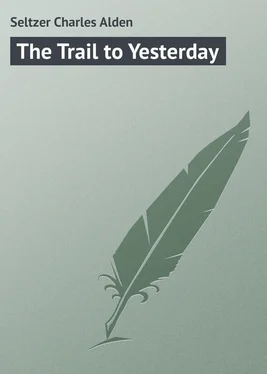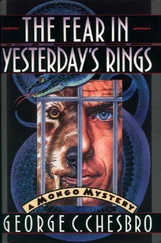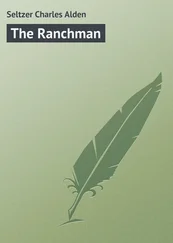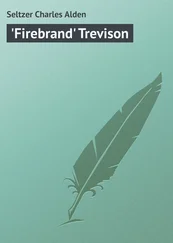Charles Seltzer - The Trail to Yesterday
Здесь есть возможность читать онлайн «Charles Seltzer - The Trail to Yesterday» — ознакомительный отрывок электронной книги совершенно бесплатно, а после прочтения отрывка купить полную версию. В некоторых случаях можно слушать аудио, скачать через торрент в формате fb2 и присутствует краткое содержание. Жанр: foreign_prose, foreign_adventure, foreign_language, на английском языке. Описание произведения, (предисловие) а так же отзывы посетителей доступны на портале библиотеки ЛибКат.
- Название:The Trail to Yesterday
- Автор:
- Жанр:
- Год:неизвестен
- ISBN:нет данных
- Рейтинг книги:3 / 5. Голосов: 1
-
Избранное:Добавить в избранное
- Отзывы:
-
Ваша оценка:
- 60
- 1
- 2
- 3
- 4
- 5
The Trail to Yesterday: краткое содержание, описание и аннотация
Предлагаем к чтению аннотацию, описание, краткое содержание или предисловие (зависит от того, что написал сам автор книги «The Trail to Yesterday»). Если вы не нашли необходимую информацию о книге — напишите в комментариях, мы постараемся отыскать её.
The Trail to Yesterday — читать онлайн ознакомительный отрывок
Ниже представлен текст книги, разбитый по страницам. Система сохранения места последней прочитанной страницы, позволяет с удобством читать онлайн бесплатно книгу «The Trail to Yesterday», без необходимости каждый раз заново искать на чём Вы остановились. Поставьте закладку, и сможете в любой момент перейти на страницу, на которой закончили чтение.
Интервал:
Закладка:
Charles Alden Seltzer
The Trail to Yesterday
CHAPTER I
A WOMAN ON THE TRAIL
Many disquieting thoughts oppressed Miss Sheila Langford as she halted her pony on the crest of a slight rise and swept the desolate and slumberous world with an anxious glance. Quite the most appalling of these thoughts developed from a realization of the fact that she had lost the trail. The whole categorical array of inconveniences incidental to traveling in a new, unsettled country paled into insignificance when she considered this horrifying and entirely unromantic fact. She was lost; she had strayed from the trail, she was alone and night was coming.
She would not have cared so much about the darkness, for she had never been a coward, and had conditions been normal she would have asked nothing better than a rapid gallop over the dim plains. But as she drew her pony up on the crest of the rise a rumble of thunder reached her ears. Of course it would rain, now that she had lost the trail, she decided, yielding to a sudden, bitter anger. It usually did rain when one was abroad without prospect of shelter; it always rained when one was lost.
Well, there was no help for it, of course, and she had only herself to blame for the blunder. For the other – not unusual – irritating details that had combined to place her in this awkward position she could blame, first Duncan, the manager of the Double R – who should have sent someone to meet her at the station; the station agent – who had allowed her to set forth in search of the Double R without a guide, – though even now, considering this phase of the situation, she remembered that the agent had told her there was no one to send – and certainly the desolate appearance of Lazette had borne out this statement; and last, she could blame the country itself for being an unfeatured wilderness.
Something might be said in extenuation of the station agent’s and the Double R manager’s sins of omission, but without doubt the country was what she had termed it – an unfeatured wilderness. Her first sensation upon getting a view of the country had been one of deep disappointment. There was plenty of it, she had decided, – enough to make one shrink from its very bigness; yet because it was different from the land she had been accustomed to she felt that somehow it was inferior. Her father had assured her of its beauty, and she had come prepared to fall in love with it, but within the last half hour – when she had begun to realize that she had lost the trail – she had grown to hate it.
She hated the desolation, the space, the silence, the arid stretches; she had made grimaces at the “cactuses” with their forbidding pricklers – though she could not help admiring them, they seemed to be the only growing thing in the country capable of defying the heat and the sun. Most of all she hated the alkali dust. All afternoon she had kept brushing it off her clothing and clearing it out of her throat, and only within the last half hour she had begun to realize that her efforts had been without result – it lay thick all over her; her throat was dry and parched with it, and her eyes burned.
She sat erect, flushed and indignant, to look around at the country. A premonitory calm had succeeded the warning rumble. Ominous black clouds were scurrying, wind-whipped, spreading fan-like through the sky, blotting out the colors of the sunset, darkening the plains, creating weird shadows. Objects that Sheila had been able to see quite distinctly when she had reined in her pony were no longer visible. She stirred uneasily.
“We’ll go somewhere,” she said aloud to the pony, as she urged the animal down the slope. “If it rains we’ll get just as wet here as we would anywhere else.” She was surprised at the queer quiver in her voice. She was going to be brave, of course, but somehow there seemed to be little consolation in the logic of her remark.
The pony shambled forward, carefully picking its way, and Sheila mentally thanked the station agent for providing her with so reliable a beast. There was one consoling fact at any rate, and she retracted many hard things she had said in the early part of her ride about the agent.
Shuffling down the slope the pony struck a level. After traveling over this for a quarter of an hour Sheila became aware of an odd silence; looking upward she saw that the clouds were no longer in motion; that they were hovering, low and black, directly overhead. A flash of lightning suddenly illuminated the sky, showing Sheila a great waste of world that stretched to four horizons. It revealed, in the distance, the naked peaks of some hills; a few frowning buttes that seemed to fringe a river; some gullies in which lurked forbidding shadows; clumps of desert growth – the cactus – now seeming grotesque and mocking; the snaky octilla; the filmy, rustling mesquite; the dust-laden sage-brush; the soap weed; the sentinel lance of the yucca. Then the light was gone and darkness came again.
Sheila shuddered and vainly tried to force down a queer lump that had risen in her throat over the desolation of it all. It was not anything like her father had pictured it! Men had the silly habit of exaggerating in these things, she decided – they were rough themselves and they made the mistake of thinking that great, grim things were attractive. What beauty was there, for instance, in a country where there was nothing but space and silence and grotesque weeds – and rain? Before she could answer this question a sudden breeze swept over her; a few large drops of rain dashed into her face, and her thoughts returned to herself.
The pony broke into a sharp lope and she allowed it to hold the pace, wisely concluding that the animal was probably more familiar with the country than she. She found herself wondering why she had not thought of that before – when, for example, a few miles back she had deliberately guided it out of a beaten trail toward a section of country where, she had imagined, the traveling would be better. No doubt she had strayed from the trail just there.
The drops of rain grew more frequent; they splashed into her face; she could feel them striking her arms and shoulders. The pony’s neck and mane became moist under her hand, the darkness increased for a time and the continuing rumble in the heavens presaged a steady downpour.
The pony moved faster now; it needed no urging, and Sheila held her breath for fear that it might fall, straining her eyes to watch its limbs as they moved with the sure regularity of an automaton. After a time they reached the end of the level; Sheila could tell that the pony was negotiating another rise, for it slackened speed appreciably and she felt herself settling back against the cantle of the saddle. A little later she realized that they were going down the opposite side of the rise, and a moment later they were again on a level. A deeper blackness than they had yet encountered rose on their right, and Sheila correctly decided it to be caused by a stretch of wood that she had observed from the crest of the rise where she had halted her pony for a view of the country. After an interval, during which she debated the wisdom of directing her pony into the wood for protection from the rain which was now coming against her face in vicious slants, her pony nickered shrilly!
A thrill of fear assailed Sheila. She knew horses and was certain that some living thing was on the trail in front of her. Halting the pony, she held tightly to the reins through a short, tense silence. Then presently, from a point just ahead on the trail, came an answering nicker in the horse language. Sheila’s pony cavorted nervously and broke into a lope, sharper this time in spite of the tight rein she kept on it. Her fear grew, though mingling with it was a devout hope. If only the animal which had answered her own pony belonged to the Double R! She would take back many of the unkind and uncharitable things she had said about the country since she had lost the trail.
Читать дальшеИнтервал:
Закладка:
Похожие книги на «The Trail to Yesterday»
Представляем Вашему вниманию похожие книги на «The Trail to Yesterday» списком для выбора. Мы отобрали схожую по названию и смыслу литературу в надежде предоставить читателям больше вариантов отыскать новые, интересные, ещё непрочитанные произведения.
Обсуждение, отзывы о книге «The Trail to Yesterday» и просто собственные мнения читателей. Оставьте ваши комментарии, напишите, что Вы думаете о произведении, его смысле или главных героях. Укажите что конкретно понравилось, а что нет, и почему Вы так считаете.












